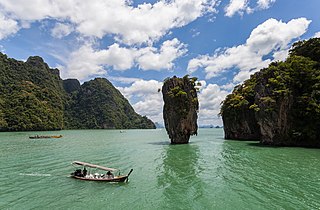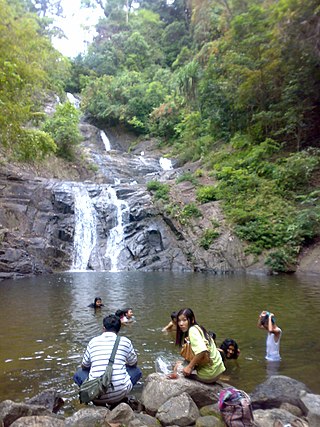
The Malay Peninsula is located in Mainland Southeast Asia. The landmass runs approximately north–south, and at its terminus, it is the southernmost point of the Asian continental mainland. The area contains Peninsular Malaysia, Southern Thailand, and the southernmost tip of Myanmar (Kawthaung). The island country of Singapore also has historical and cultural ties with the region.

In Greek mythology, Melicertes, later called Palaemon or Palaimon (Παλαίμων), was a Boeotian prince as the son of King Athamas and Ino, daughter of King Cadmus of Thebes. He was the brother of Learchus.

Khao Sam Roi Yot National Park is a marine national park in Kui Buri District, Prachuap Khiri Khan Province, Thailand. It covers 61,300 rai ~ 98 square kilometres (38 sq mi) of which 13,050 rai ~ 21 square kilometres (8.1 sq mi) are marine areas. The park was established in 1966, and was the first coastal national park of Thailand. The park includes Thailand's largest freshwater marsh.

Mangrove forests, also called mangrove swamps, mangrove thickets or mangals, are productive wetlands that occur in coastal intertidal zones. Mangrove forests grow mainly at tropical and subtropical latitudes because mangrove trees cannot withstand freezing temperatures. There are about 80 different species of mangroves, all of which grow in areas with low-oxygen soil, where slow-moving waters allow fine sediments to accumulate.

Acanthus is a genus of about 30 species of flowering plants in the family Acanthaceae, native to tropical and warm temperate regions, with the highest species diversity in the Mediterranean Basin and Asia. This flowering plant is nectar producing and depends on butterflies, such as Anartia fatima, and other nectar feeding organisms to distribute its pollen. Common names include Acanthus and bear's breeches. The generic name derives from the Greek term ἄκανθος (akanthos) for Acanthus mollis, a plant that was commonly imitated in Corinthian capitals.

Boiga dendrophila, commonly called the mangrove snake or the gold-ringed cat snake, is a species of rear-fanged venomous snake in the family Colubridae. The species is endemic to southeast Asia. It is one of the biggest cat snake species, averaging 8–9 feet in length. It is considered mildly venomous. Although moderate envenomations resulting in intense swelling have been reported, there has never been a confirmed fatality.

Hat Khanom–Mu Ko Thale Tai is a national park in the process of being established as of 2015. It is in southern Thailand, covering territory of the districts Khanom and Sichon of Nakhon Si Thammarat Province and Don Sak and Ko Samui of Surat Thani Province.

Palaemon is a genus of caridean shrimp in the family Palaemonidae.
The Pran Buri Forest Park is a protected area in Thailand. It is at the mouth of the Pran Buri River to the Gulf of Thailand in Pran Buri District, Prachuap Khiri Khan Province.

The mangrove pitta is a species of passerine bird in the family Pittidae native to the eastern Indian Subcontinent and western Southeast Asia. It is part of a superspecies where it is placed with the Indian pitta, the fairy pitta and the blue-winged pitta but has no recognized subspecies. A colourful bird, it has a black head with brown crown, white throat, greenish upper parts, buff underparts and reddish vent area. Its range extends from India to Malaysia and Indonesia. It is found in mangrove and nipa palm forests where it feeds on crustaceans, mollusks and insects. Its call, sometimes rendered as wieuw-wieuw, is sung from a high perch on a mangrove tree.

Thalassina is a genus of mud lobsters found in the mangrove swamps of the Indian Ocean and western Pacific Ocean. Its nocturnal burrowing is important for the recycling of nutrients in the mangrove ecosystem, although it is sometimes considered a pest of fish and prawn farms.

Ao Phang Nga National Park, located in the Phang Nga Province of the Southern Thailand, encompasses parts of Mueang Phang Nga District and Takua Thung District. The park is predominantly maritime, featuring a section of the Strait of Malacca dotted with numerous limestone tower karst islands. Among these islands, Khao Phing Kan stands out as particularly well-known, having gained the nickname 'James Bond Island' due to its use as a filming location for the James Bond film The Man with the Golden Gun.

Palaemon serratus, also called the common prawn, is a species of shrimp found in the Atlantic Ocean from Denmark to Mauritania, and in the Mediterranean Sea and Black Sea.

Laem Son National Park is located in Ranong and Phangnga provinces, Thailand. It is situated 60 kilometres (37 mi) south of Ranong on the country's west coast, with 100 kilometres (62 mi) of Andaman Sea coastline, making it Thailand's longest protected shore. The marine national park is named after the pines along the cape's shore. It was established in 1983, and is 196,875 rai ~ 315 square kilometres (122 sq mi) in size.

Khao Lampi–Hat Thai Mueang National Park is a national park in Phang Nga Province, Thailand. The park is named for its two separate sections: Khao Lampi named for the park section containing Lampi mountain range and Hat Thai Mueang, the beach section of the park.

Sirinat National Park is a national park in Phuket Province, Thailand. This park, with sections on land and sea, is in the northwest of the island of Phuket.

Palaemon concinnus, the mangrove prawn, is a species of shrimp of the family Palaemonidae. Palaemon concinnus is found throughout the Pacific Ocean and Mozambique.
Palaemon khori is a species of shrimp of the family Palaemonidae. It is native to the mangrove swamps of Qatar.

Bang Lamphu or spelled Banglampoo and Banglamphu is a neighbourhood in Bangkok located in Phra Nakhon District. The history of the Bang Lamphu community dates to the establishment of the Rattanakosin Kingdom, or earlier. Bang Lamphu covers an area north of Phra Nakhon both inside and outside Rattanakosin Island from Phra Athit to Samsen Roads, which leads toward Dusit District. Most of the area of Bang Lamphu is in Talat Yot Subdistrict, some have spread to various nearby subdistricts including Chana Songkhram, Bowon Niwet, Ban Phan Thom up till Wat Sam Phraya.
















